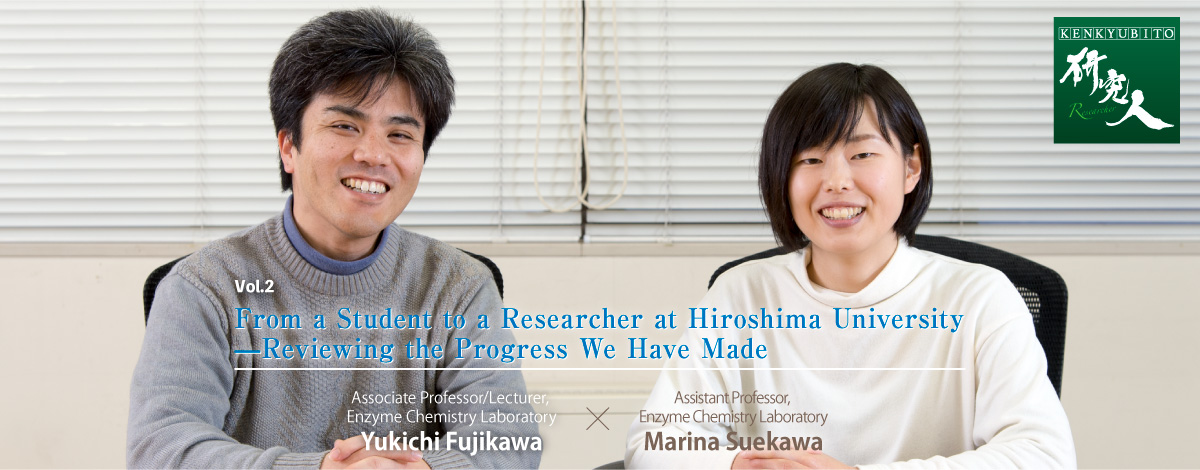
“Committed to Elucidation of Enzymes at Molecular Level, Our Common Research Subjects”
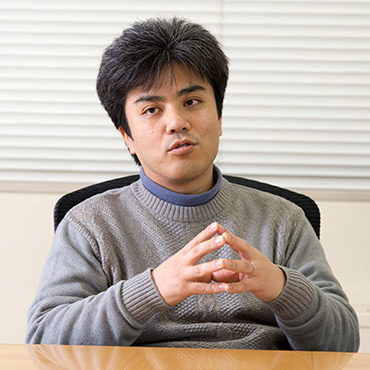
- Yukichi Fujikawa
- Associate Professor/Lecturer, Enzyme Chemistry Laboratory
- March 1, 2008–March 31, 2012
Assistant Professor, School of Applied Biological Sciences - April 1, 2012–Present
Associate Professor/Lecturer, School of Applied Biological Sciences
Fujikawa: Today we are going to have a dialogue, as researchers who have been working in the same laboratory—the Enzyme Chemistry Laboratory. I feel a little shy about exchanging views with you in such a formal setting, but I hope we can talk about things that we have somehow not been able to discuss so far. Shall we begin?
Suekawa: Yes, sure.
Fujikawa: Both you and I alike advanced from the School of Applied Biological Science to the School of Applied Biological Science. After that, however, I myself entered the Laboratory of Molecular Cell Biology (now Aquatic Biochemistry), and move on to the doctoral course there. I then went to a different university where I continued my research as a postdoctoral researcher. It was then that I found Hiroshima University was publicly inviting applications for the post of Assistant Professor in the Enzyme Chemistry Laboratory. I successfully gained the post and began to work as a faculty member here.
Suekawa: I heard that you initially studied on enzymes in fish.
Fujikawa: Yes, I had been engaged in biochemical research into digestive enzymes in red sea bream. I studied the characteristics of the enzymes and the timing of their gene expression. Around that time, joint research was under way between my supervisor, Professor Noriaki Iijima(*1), and Professor Muneharu Esaka(*2)belonging to the Enzyme Chemistry Laboratory, because they used molecular biological techniques similarly for both fish and plant. Since I had interacted with the present laboratory through the joint research, I didn’t feel that I had come to a place that was unrelated to me. Now I feel that I am conducting molecular biological study using plants as my research subjects, instead of fish. When I was a postdoctoral researcher, I was engaged in the development of an assay system for detection of protein-protein interaction, while pursuing research on the biological system in a cell. I was working on developing a method for effectively detecting protein-protein interaction that were associating and dissociating in a living plant cell. In this sense, it can be said that my past research had something to do with plants. Currently, I am working on research to breed stress-resistant plants, by making effective use of plant enzymes.
Suekawa: I see. I myself was originally interested in environmental issues. So I vaguely wanted to conduct research that could help resolve such problems. One of the research themes I wished to address was the stress tolerance of plants. For example, I wanted to breed a plant that could grow in the desert, or in salt-damaged soil. Hoping to pursue study into such stress-resistant plants, I joined the laboratory of Professor Esaka.
Fujikawa: Your dissertation was on that very theme.
Suekawa: Yes. I wrote my dissertation entitled “Physiological functions and gene expression mechanisms of aldo-keto reductase (AKR) in tomato.” It had been already found that the gene expression of this enzyme was increased by salt and oxidative stress. Focusing on this fact, I investigated the roles of this enzyme in response to stress, and analyzed the stress-responsive mechanisms in which this enzyme expressed in large quantities.
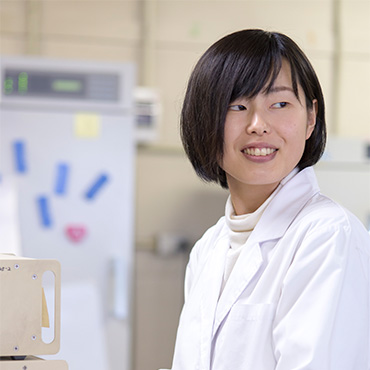
- Marina Suekawa
- Assistant Professor, Enzyme Chemistry Laboratory
March 23, 2018 Received her doctorate degree in agriculture from the School of Applied Biological Science, Hiroshima University - April 1, 2015–March 31, 2017
Research Assistant, School of Applied Biological Sciences - April 1, 2017–March 31, 2018
Overseas Research Fellow (DC2) of Japan Society for the Promotion of Science - April 1, 2018–Present
Assistant Professor, School of Applied Biological Sciences
Fujikawa: Our laboratory belongs to the Applied Molecular & Cellular Biology Course, which is one of the five courses offered in the School of Applied Biological Science. As the course name indicates, both you and I share a common interest in molecular studies.
Suekawa: That’s true. If we had moved on to the Integrated Ecoscience Course, which has the Plant Nutritional Physiology Laboratory, our research activities would have covered a wider scope...
Fujikawa: The Plant Nutritional Physiology Laboratory carries out studies on the functions and characteristics of plants, not only at a molecular or cellular level, but also on a field level. It is often said that while the Plant Nutritional Physiology Laboratory focuses on outdoor research, our Enzyme Chemistry Laboratory is...
Fujikawa and Suekawa:Indoor-oriented! (Laughs)
Suekawa: Basically, our laboratory conducts research activities indoors. (Laughs) In the Applied Molecular & Cellular Biology Course, our laboratory is the only one to pursue plant studies. Students in the School of Applied Biological Science don’t have to select their courses at the time of enrollment, and they can select their courses in the second semester of their second year. This means that the School allows its students to choose a course they wish to study in the future, after learning in a very wide range of fields for a year and a half. I think this is one of the attractive features of this School.
Fujikawa: I agree. Students in the School of Applied Biological Science can decide the course they are interested in, after actually having taken various lectures.
Suekawa: I also think it is not good for those conducting agricultural studies to learn in their fields of interest alone. They should start specialized research activities, after studying a lot of things across a broad spectrum of disciplines. For example, for students wishing to study plants, learning only about plants is not enough. Since plants are only a small constituent of various environments on this planet, I believe it is important for students to first learn various things as a whole, and then start more specialized studies.
“What is the real pleasure of research? What is required to be a professional researcher?”
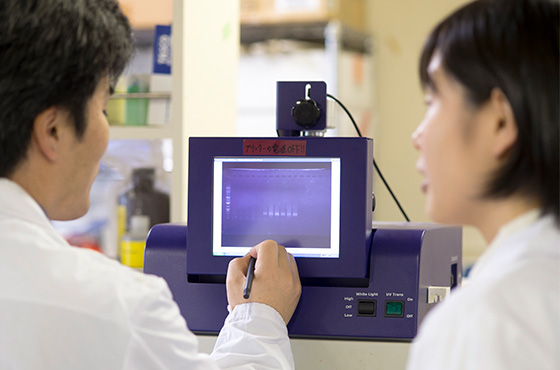
Suekawa: What do you think is the interesting aspect of research? Though it may be a stereotypical answer, I myself feel that what is very interesting is that I can be the first to discover something that nobody has ever known before. Previously, when I could not achieve what I expected in experiments, I sought advice from members in neighbor laboratory. One of them once said to me, “It is more fun when I get an unexpected result.” When I asked the reason, he replied “It is because there may be another discovery we cannot easily understand—something that goes beyond our imagination. It will lead to a new idea. If we can clarify something we cannot easily imagine, it will be more enjoyable.” What do you think?
Fujikawa: Basically, I feel the same way as you. It’s true that I can feel a sense of achievement when the expected result is obtained. On the other hand, however, when I get an unexpected result, I wonder the reason why. So research work always involves constantly wondering about what’s going on. (Laughs) In the case of student experiment, experiments are generally successful, because these experiments have proved successful. However, our research activities entail trouble more often. If we feel negatively about such trouble, it will probably be hard for us to continue our research activities. Even if anyone else thinks we have a lot of trouble, there is no problem as long as we don’t think so. I think researchers need to have a kind of flexibility, but that doesn’t mean they should simply be optimistic. Researchers must work very hard. If a student feels it is hard or burdensome to continue such hard work, the student is not suited to being a researcher.
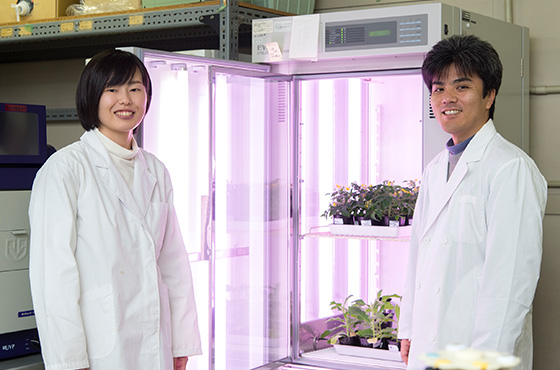
Suekawa: That’s true. As you just said, in actual research practice, usually things do not go well. So we have to be patient enough to continue working, without giving up so soon. Conversely, if we can easily obtain the desired result, perhaps we won’t find the research very interesting. I believe that continuing research while struggling to address problems will lead to very interesting results. As such, researchers must have the ability to continue to pursue their studies without giving up easily.
Fujikawa: Well, in practice, I think everyone who joins our laboratory will eventually become somewhat resistant to environmental stress. (Laughs)
Suekawa: I know what you mean. I myself feel I am now more resistant than when I was just assigned to this laboratory. (Laughs). Immediately after entering the laboratory, I didn’t know at all how to proceed with the research. At that time, I just did what you told to me to do, reported the results to you, and waited for your suggestion on what to do next. However, this flow changed as I advanced to the master’s and then the doctoral course. I gradually became able to do experiments and think by myself, and came to see you for consultation, with my own ideas. In other words, my attitude toward research changed little by little. Although initially I conducted research mostly under your leadership, I later became able to think by myself about what I should do next, under my own initiative. Along with this shift, I can find greater joy in doing research. I think I have finally begun to understand the real pleasure of being a researcher, and what is required to be a researcher, step by step.
“Dependable Support Systems that Hiroshima University Can Offer”
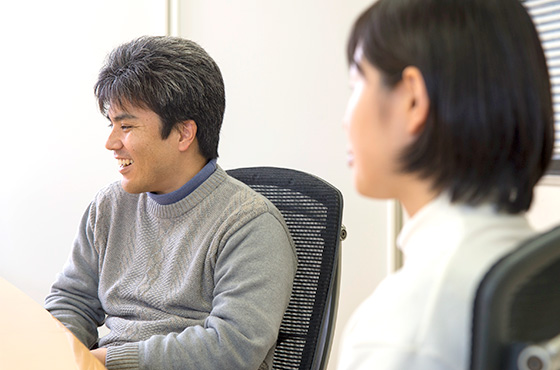
Fujikawa: Ms. Suekawa, you are truly an excellent student. In fact, you were selected to receive the Hiroshima University Excellent Student Scholarship as an outstanding performance student(*3) for consecutive two years.
Suekawa: Thank you. I was happy to be selected as the scholarship recipient for the consecutive academic years 2016 and 2017. I owe this to your continued guidance, and would like to express my appreciation once again.
Fujikawa: You’re welcome, but I attribute your achievement to your endeavors. You are always very enthusiastic and earnest. You also proceed with your research with intrigue, on you own initiative. For example, you provide students with advice on what they fail to see, and guide them in a responsible manner. I can therefore entrust you to guide our students with peace of mind. Furthermore, you’re good at relaxing yourself even when you have some difficulty with your research. To tell the truth, before you joined our laboratory, you had a good reputation among the other professors. Nevertheless, I myself didn’t know very much about you before you came to our laboratory. (Laughs) Of course I knew you by name, but I didn’t know your true ability, because we hadn’t had any opportunity to come into contact. After you entered our laboratory, when I heard a professor of another laboratory ask you “Why didn’t you come to my laboratory?” I recognized your value anew. Although there are some people who are not well received compared to when they were undergraduate students, your reputation stills remains high. This means you are highly evaluated, and truly deserve to be called “excellent.”
Suekawa: Thank you for your praise, but I feel a little embarrassed.
Fujikawa: Our laboratory requires students to have some degree of independence. Of course, we give guidance and instructions to students, but their success is up to them, in principle. Accordingly, whether they can receive various kinds of awards or commendations depends on their efforts and abilities. Even if you say to me that “My success is due to your guidance,” I really think this is not true at all.
Suekawa: However, I have actually been given a great many opportunities to think by myself about what I want to do next in my research, since our laboratory adopts a policy of providing guidance placing importance on students’ independence, as you said earlier. That was a part of the reason I could find interest in pursuing research. That convinced me that this laboratory was the right choice for me.
Fujikawa: I also think that our laboratory has a favorable atmosphere. Professor Esaka, who leads the Enzyme Chemistry Laboratory, has a pleasant personality, which is reflected in his face.
Suekawa: That’s true. He keeps smiling every day. Professor Esaka is easy to approach. Members of our laboratory are also happy with you, since you listen to us sympathetically. We can easily consult you about our studies—whenever we don’t know how to do something, no matter how trivial it may be. Needless to say, we can talk to you about matters other than research. However, I have a little problem when talking to you, because there always seems to be someone around you. (Laughs)
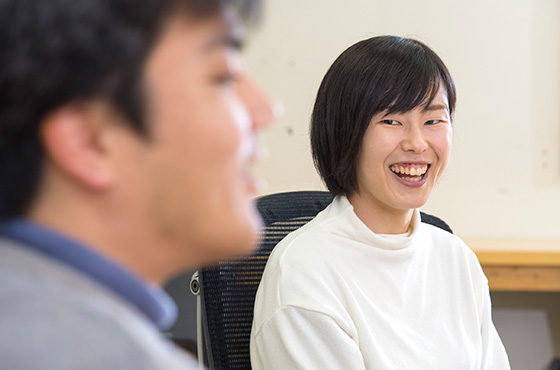
Fujikawa: I like our laboratory, where all members get along well with each other. To get back to what I was saying about you…you were able to reduce the financial burden of your tuition fees considerably, thanks to the Excellent Student Scholarship, weren’t you?
Suekawa: Yes. In addition to an honor, I received tuition exemption for the latter half of the school year. I was also employed as a TA(*4) and a RA(*5), and awarded the Research Fellowship for Young Scientists (DC2) by the Japan Society for the Promotion of Science (JSPS)(*6). Owing to the financial support for TA and RA and the grant-in-aid for the JSPS research fellowship, my financial burden was significantly reduced, which also made it much easier for me to devote myself to my research. I was very grateful for these support systems.
Fujikawa: You were appointed as an Assistant Professor of the Enzyme Chemistry Laboratory this spring, before your research fellowship term expires. Congratulations!
Suekawa: Thank you very much. I hope to still be able to receive your support.
Fujikawa: It would be my pleasure. As in your case, another vital factor for becoming a researcher is to take advantage of an opportunity. You were given a timely opportunity when you achieved sufficient results to apply for the post, and successfully seized the opportunity. I therefore think it is important to be able to take on a challenge if a good opportunity suddenly arises.
Suekawa: That makes sense. You have also taken advantage of opportunities, haven’t you?
Fujikawa: Yes. I’ve made my way while seizing good chances. (Laughs) Now I feel I should continue to pursue even greater research activities, so you can feel happy to have been appointed as an Assistant Professor at this laboratory.
Suekawa: Thank you very much for your consideration. I am determined to do my best, to ensure that my experience here is meaningful.
Fujikawa: Our university has been holding an event called “The Hiroshima University Knowledge Forum(*7),” inviting a variety of world-renowned researchers as lecturers. In the same capacity as a researcher, let us grow together to reach new heights.
“We aim to conduct research that can contribute to society—Enzymes will play a role.”
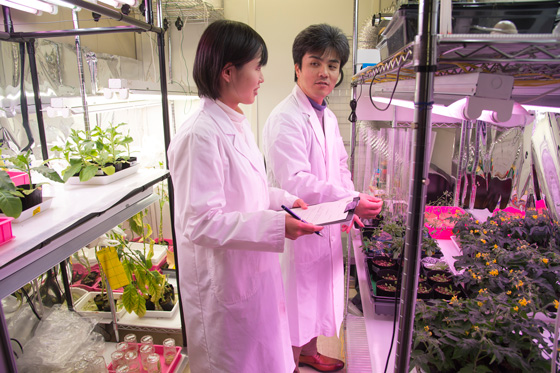
Fujikawa: What are your future goals as a researcher?
Suekawa: Well, in the first place, my interest in research stemmed from concern about environmental issues. Since I have always been hoping to address environmental issues, my future goals are to obtain research findings that will lead to solutions to these problems, and to make effective use of them to give back to society in many ways. With a major focus on achieving these goals, I hope to be a researcher who can contribute to the betterment of the world through my own research outcomes.
Fujikawa: After all, researchers generally want to work for the benefit of society in some way or other. However, it should be remembered that research cannot be conducted by a single person. In practice, at Hiroshima University, researchers studying plants have been brought together to form a group(*8). Professor Esaka and I have joined the group to work in concert. Since there is a limitation to the amount of research results that can be achieved by a single researcher, multiple researchers combine forces to produce greater outcomes. Researchers have this kind of image.
Suekawa: I hear that a lot. You are also highly aware of environmental issues, aren’t you?
Fujikawa: Of course. I’m conscious of environmental issues, as well as food issues. About half of crop yield is lost due to environmental stress around the world. If we can produce plant species with great tolerance to environmental stress, the percentage of lost yield can be reduced, for instance, from 50% to 20%. This could be of some help in resolving food issues. Since enzymes facilitate in-vivo chemical reactions, basically we cannot live without enzymes. I conduct my research in the hope of contributing to resolving environmental and food issues—even if only slightly, by making effective use of the properties of enzymes to enhance plant functions.
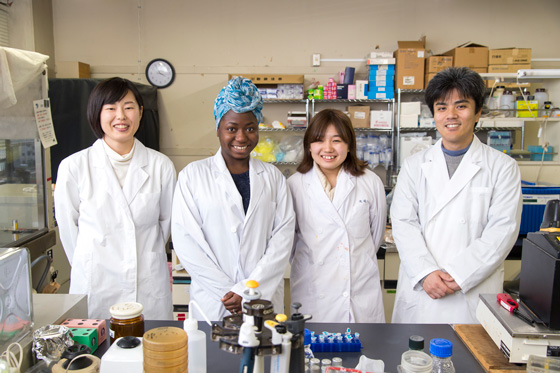
Suekawa: The Enzyme Chemistry Laboratory has been active in conducting joint research projects with overseas partners, in such countries as the United States and the Dominican Republic. When I was a student, I had few opportunities to participate in these projects. From now on, I would like to take part in such collaboration with overseas institutions.
Fujikawa: By all means! It is heartening to have your participation in these international collaboration projects. So far, Professor Esaka and I have worked as faculty of the Enzyme Chemistry Laboratory. Now that you have joined us, the three of us will be able to further advance our research activities. It’s about time to wrap up today’s dialogue. I’m glad we’ve been able to discuss so many things today. Thank you.
Suekawa: Thank you, too. I hope to receive your continued guidance and support.
【Interviewed on February 15, 2018】



*Note